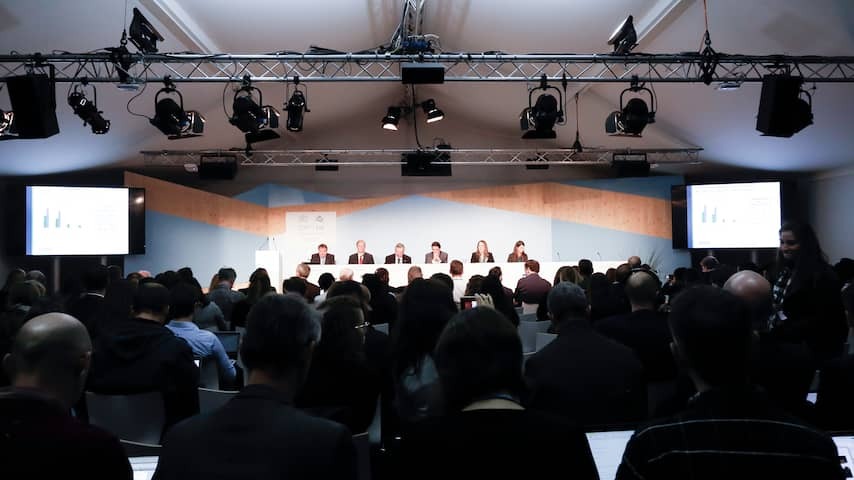
In Germany, a relatively unknown climate summit took place this week, while it may be the most important place for global climate agreements. At a time when crises and wars overshadow the climate, countries tried to come closer together – here and there with success.
Between the NATO summit and the war between Iran and Israel, you could almost forget that climate negotiations took place in Bonn this week. Because in addition to the annual climate summit in November – this year in Belém at the foot of the Brazilian Amazon – there is another climate summit.
In the cute and somewhat sleepy city of Bonn on the Rhine, not much exciting usually happens. But once a year, the former West German capital is flooded with diplomats from all over the world. From Fiji to Gambia and from Uruguay to China. Not only Europeans gather here to talk about the climate, but virtually every country is represented.
With about seven thousand people from 196 countries, the summit in Bonn is seven times smaller than the Conference of the Parties (COP), but perhaps more effective. It is a summit without political leaders, with less press and above all: less drama. The two weeks in Bonn lay the foundation for the decisions in November.
Of course, Bonn is about the climate, but also about a range of topics that touch on it, such as adaptation, justice, gender and financing, a sensitive issue.
In Bonn, countries made progress on several climate agreements this time, such as how the global energy transition can be as fair as possible for everyone. There were also small breakthroughs in the area of the position of women and girls. And countries also agreed on money for adaptation measures. This week, a significant part of the groundwork for the climate summit in Brazil was done.
Frustration comes back as a ‘boomerang’ in climate talks
The summit in Bonn got off to a rather difficult start: due to a dispute, the talks started two days later than planned. A group of developing countries was frustrated because it had already been determined in advance that Bonn would not be about money.
They wanted to discuss this after a disappointing outcome for them at last year’s climate summit. It was agreed there that 300 billion euros in climate support would be provided for poor countries, while research by, among others, the United Nations shows that much more is needed.
Many developing countries are hard hit by the consequences of climate change, but do not have the money and resources to arm themselves against it and do not want to end up in debt through loans. They also point out that they are not responsible for causing the climate crisis.
The money issue cast a shadow over the other talks, noted Hilde Stroot of Oxfam Novib, who was present at the negotiations in Bonn. “It keeps coming back like a boomerang.”
Most countries are late in submitting climate plan
Rich countries did not want to discuss again. As far as they were concerned, that chapter was closed at the previous climate summit. For example, the European Union wants to focus on tackling climate change (mitigation). According to the Dutch negotiators, the talks were constructive. The majority of countries want to continue with mitigation, they see.
Yet almost all countries – including those in the EU – are late in submitting their climate plans for 2035, an important part of the Paris Agreement. The deadline was in February and at the end of June the counter stands at 25 submissions.
The absolute submission date is in September: then it will become clear whether all those plans together are enough not to exceed 1.5 degrees of warming. Most likely that is not the case. The world already passed that limit last year.
Climate must compete with other crises
With representatives from the 196 countries, the tensions on the world stage were also palpable in Bonn. There, the seat of the United States remained empty for the first time in decades. President Donald Trump withdrew the country from the Paris Agreement for the second time. And while climate was being discussed in Bonn, NATO countries in The Hague agreed to increase their defense spending.
The climate has to compete with many other crises, but does not seem to have lost momentum yet. Not even without the US. “All the other countries were there and have shown that they want to continue,” says Barbara Rosen Jacobson of the NGO Mercy Corps. “That sends a clear signal that they want to work it out together.”
Work to be done in the run-up to the thirtieth climate summit
Tired faces marked the closing session in the gigantic hall. That ran unexpectedly for hours. Brazil, the country that is organizing the climate summit at the end of this year, kept its spirits up with a final speech.
Ten years after the Paris Agreement, the country hopes to put itself on the map with the same kind of breakthrough as in Paris in 2015, when countries agreed on the 1.5 degree target. “The spirit of the Paris Agreement is not only alive and well, but stronger than ever,” said Brazilian climate envoy Liliam Chagas during the closing statement.
The summit in Bonn has shown that despite disagreements and geopolitical tensions, the world is taking steps on climate action. The question is whether those steps are big and fast enough.
All eyes are now on the Brazilians, who have the important task of making the upcoming climate summit a success. UN climate chief Simon Stiell also knows that: “I’m not going to make it prettier than it is. We still have a lot of work to do before we see each other in Belém.”